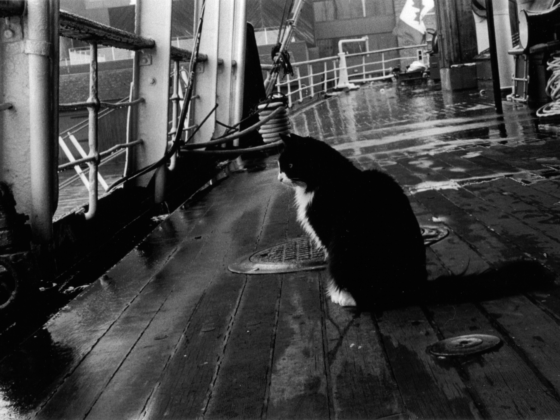An enthusiastic crowd of workmen and seafarers gathered one day long ago at Blackwall to witness the launching of the Lion.
Every man among them felt a personal interest in the majestic fabric that, under the proud labours of those skilful shipwrights, had gradually grown up out of the trim piles of oak, greenheart, and teak, and taken on the splendid shape of an East Indiaman, in the days when those grand vessels were queens of the wide sea. Greens renowned draughtsmen had lavished all their skill upon her design, every device known to men whose calling was their pride, and to whom the Blackwall Yard was the centre of the shipbuilding world, had been employed to make the Lion the finest of all the great fleet that had been brought into being there. Decked with flags from stem to stern, the sun glinting brightly on the rampant crimson lion that towered proudly on high from her stem, she glided gracefully from the ways amid the thunder of cannon and the deafening shouts of exultant thousands. And when, two months later, she sailed for Madras with eighty prime seamen forrard and a hundred passengers in her spacious cuddy, who so proud as her stately commander? His eye flashed as he watched the nimble evolutions of his bonny bluejackets leaping from spar to spar, and he felt that, given fitting opportunity, he would have no overwhelming task to tackle a French line-of-battle ship, even though he was but a peaceful merchantman. For ranged on either side of her roomy decks were ten 18-pounders, under the charge of a smart gunner, whose pride in his new post was a pleasant thing to see. And besides these bulldogs there were many rifles and boarding-pikes neatly stowed in a small armoury in the waist. But above and beyond all these weapons were the men who would use them,sturdy, square-set British sea-dogs, such as you may now see any day swarming upon the deck of a British man-o-war, but may look for almost in vain on board the swarming thousands of vessels that compose our merchant fleet.
The Lion soon justified all the high hopes of her builders and owners. In spite of her (then) great size and the taut spread of her spars, she was far handier than any Billy-boythat ever turned up the Thames estuary against a head wind, and by at least a knot and a half the fastest ship in the East India trade. Her fame grew and waxed exceedingly great. There was as much intriguing to secure a berth in the Lion for the outward or homeward passage as there was in those days for positions in the golden land she traded to. Almost all the hierarchy of India spoke of her affectionately as one speaks of the old home, and the newly-arrived in her knew no lack of topics for conversation if they only mentioned her name in any company. For had she not borne safely and pleasantly over the long, long sea-road from home hundreds and hundreds of those pale-faced rulers of dusky millions, bringing them in their callow boyhood to leap at a bound to posts of trust and responsibility such as the proud old Romans never dreamed of? She was so tenderly cared for, her every want so immediately supplied, that this solicitude, added to the staunchness and honesty of her build, seemed to render her insusceptible of decay. Men whose work in India was done spoke of her in their peaceful retirement on leafy English countrysides, and recalled with cronies our first passage out in the grand old Lion.A new type of ship, a new method of propulsion, was springing up all around her. But whenever any of the most modern fliers forgathered with her upon the ocean highway, their crews felt their spirits rise in passionate admiration for the stately and beautiful old craft whose graceful curves and perfect ease seemed to be of the sea sui generis, moulded and caressed by the noble element into something of its own mobility and tenacious power.
It appeared almost a loss of dignity when the Company took her off the India route and held her on the Australian berth. But very soon she had taken the place that always appeared to be hers of right, and she was the ship of all others wherein to sail for the new world beneath us. And in due course the sturdy Empire-builders scattered all over the vast new country were speaking of her as the Anglo-Indians had done a generation ago, and the new chum who had come out in the Lion found himself welcome in far-away bush homes, from Adelaide to Brisbane, as one of the same family, a protégé of the benevolent old ship. She held her own well, too, in point of speed with the new steel and iron clippers, in spite of what foolish youngsters sneeringly said about her extended quarter-galleries, her far-reaching head, and immense many-windowed stern. But gradually the fierce stress of modern competition told upon her, and it needed no great stretch of the imagination to suppose that the magnificent old craft felt her dignity outraged as voyage after voyage saw her crew lists dwindle until instead of the eighty able seamen of her young days she carried but twenty-two. The goodly company of officers, midshipmen, and artificers were cut down also to a third of their old array, and as a necessary consequence much of her ancient smartness of appearance went with them. Then she should have closed her splendid career in some great battle with the elements, and found a fitting glory of defeat without disgrace before the all-conquering, enduring sea. That solace was not to be hers, but as a final effort she made the round voyage from Melbourne to London and back, including the handling of two cargoes, in five months and twenty days, beating anything of the kind ever recorded of a sailing-vessel.
Then, oh woeful fall! she was sold to the Norwegians, those thrifty mariners who are ever on the look-out for bargains in the way of ships who have seen their best days, and manage to succeed, in ways undreamed of by more lavish nations, in making fortunes out of such poor old battered phantoms of bygone prosperity. Tenacious as the seamans memory is for the appearance of any ship in which he has once sailed, it would have been no easy task for any of her former shipmates to recognise the splendid old Lion under her Scandinavian name of the Ganger Rolf, metamorphosed as she was too by the shortening of her tapering spars, the stripping of the yards from the mizen-mast, and the rigging up of what British sailors call the Norwegian house-flag, a windmill pump between the main and mizen masts. Thus transformed she began her degraded existence under new masters, crawling to and fro across the Atlantic to Quebec in summer, Pensacola or Doboy in winter, uneasily and spiritless as some gallant hunter dragging a timber waggon in his old age. Unpainted, weather-bleached, and with sails so patched and clouted that they looked like slum washing hung out to dry, she became, like the rest of the wood-scows, a thing for the elements to scoff at, and, seen creeping eastward with a deck-load of deals piled six feet high fore and aft above her top-gallant rail, was as pathetic as a pauper funeral. Eight seamen now were all that the thrift of her owners allowed to navigate her, who with the captain, two mates, carpenter, and cook, made up the whole of her crew, exactly the number of the officers she used to carry in her palmy days.
One day when she was discharging in London there came alongside an old seaman, weather-worn and hungry-looking. Something in the build of the old ship caught his eye, and with quivering lips and twitching hands he climbed on board. Round about the deck he quested until, half hidden by a huge pile of lumber, he found the bell and read on it, Lion, London, 1842. Then he sat down and covered his face with his hands. Presently he arose and sought the grimy mate purposefully. At an incredibly low wage he obtained the berth of cook,it was either that or starve, although now he had found his old ship, he felt that he would go for nothing rather than miss another voyage in her. Soon after they sailed for the fall voyage to Quebec, making a successful run over, much to the delight of the ancient cook, who was never weary of telling any one who would listen of the feats of sailing performed by the Lion when he was quartermaster of her way back in the fifties. Urged by greed, for he was part-owner, and under no fear of the law, the skipper piled upon her such a deck-load of deals that she no longer resembled a ship, she was only comparable to a vast timber stack with three masts. She was hardly clear of Newfoundland on her homeward passage, when one of the most terrible gales of all that terrible winter set in. Snow and sleet and frost-fog, a blinding white whirl of withering cold, assailed her, paralysing the hapless handful of men who vainly strove on their lofty platform to do their duty, exposed fully to all the wrath of that icy tempest. One after one the worn-out sails, like autumn leaves, were stripped from yard and stay; day after day saw the perishing mariners die. The sea froze upon her where it fell, so that now she resembled an iceberg; and though the remnant of the crew tried many times to get at the fastenings of the chains that secured the deck-load so as to send it adrift, they could not. At last only one man was left alive, and he, strangely enough, was the old cook. And while still the gale was at its height, he suddenly seemed to renew all his lost strength. Buckling tight his belt with firm fingers, a new light gleaming in his eyes, he strode aft and seized the long-disused wheel. Standing erect and alert he conned her gravely, getting her well before the wind. Onward she fled, as if knowing the touch of an old friend. Gradually the lean fingers stiffened, the fire died out of the eyes, until, just as the last feeble drops in that brave old heart froze solid, the Lion dashed into a mountainous berg and all her shattered timbers fell apart. Lovely and pleasant had she been in her life, and in her death she was no danger to her wandering sisters.











